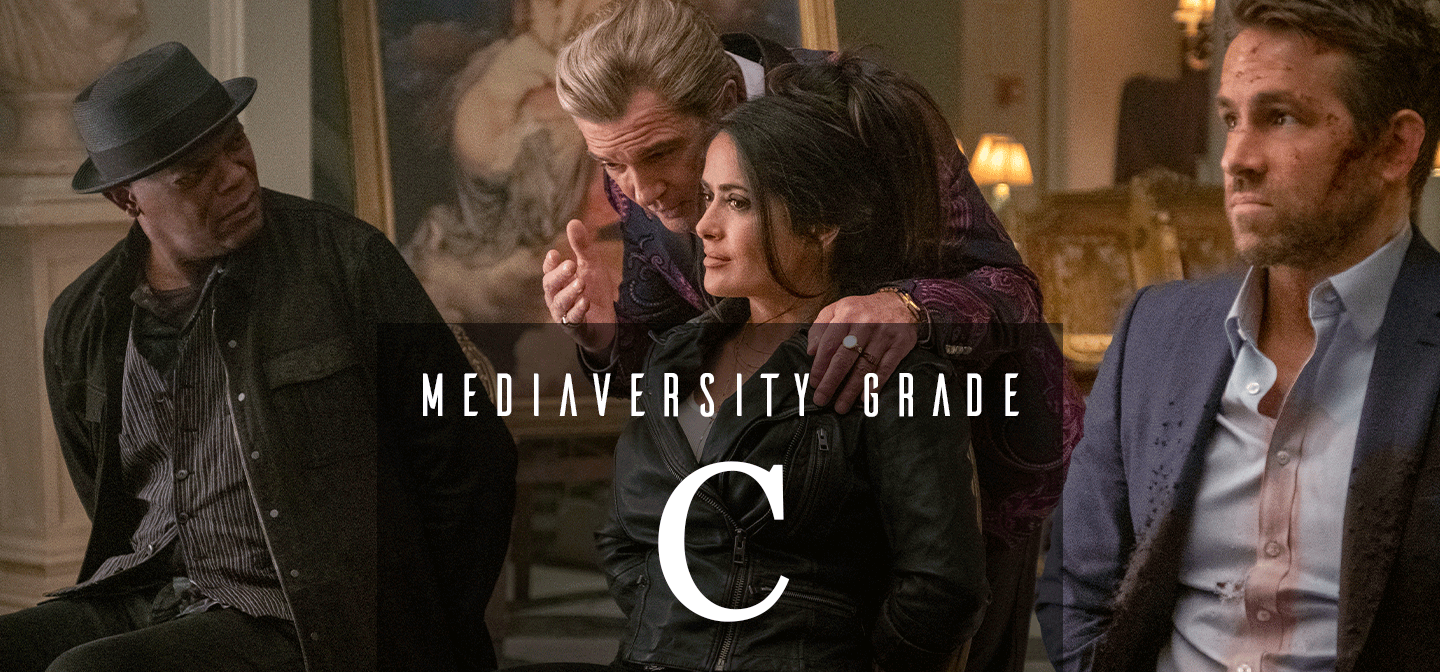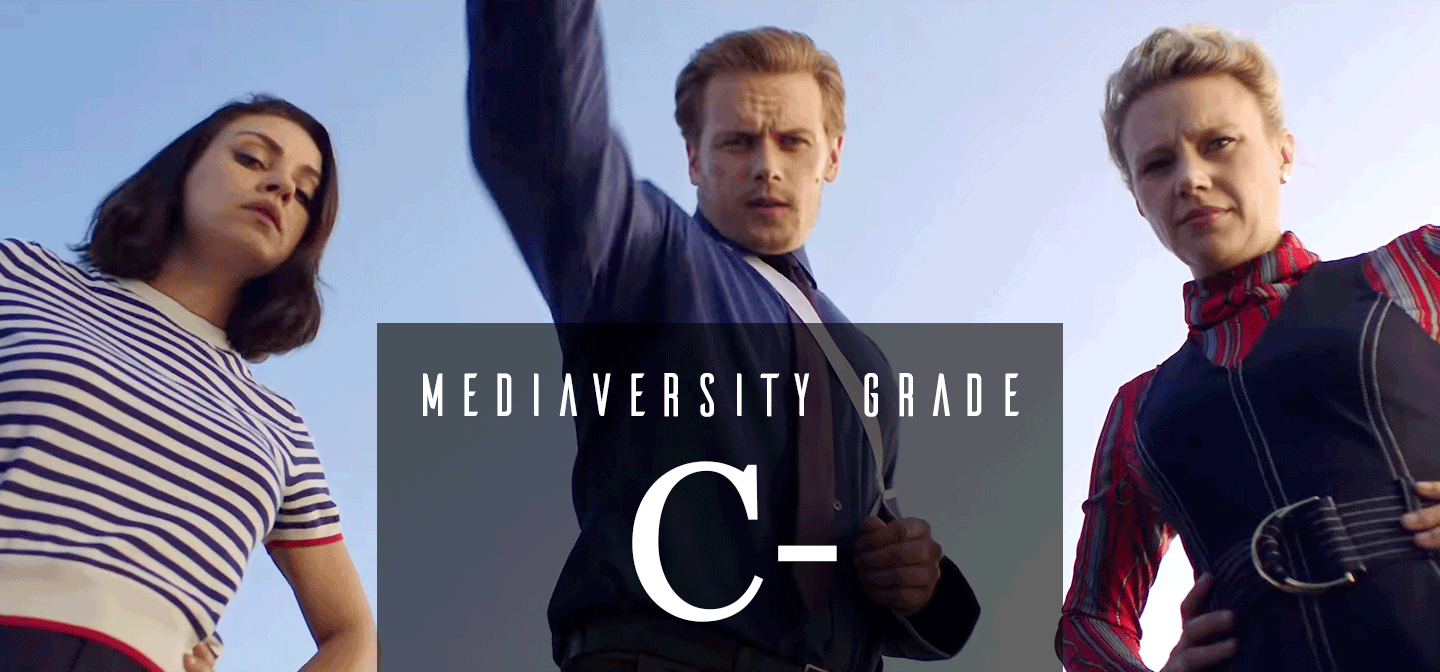The Hitman's Wife's Bodyguard
“The Hitman’s Wife’s Bodyguard relies on racially themed humor that’s mostly self aware but ultimately unfunny.”
Title: The Hitman's Wife's Bodyguard (2021)
Director: Patrick Hughes 👨🏼🇦🇺
Writers: Tom O'Connor 👨🏼🇺🇸, Brandon Murphy 👨🏼🇺🇸, and Phillip Murphy 👨🏼🇺🇸
Reviewed by Roxana Hadadi 👩🏽🇺🇸
Note: This review was commissioned by Lionsgate. The content and methodology remain 100% independent and in line with Mediaversity's non-commissioned reviews.
—SPOILERS AHEAD—
Technical: 2/5
In 2017, The Hitman’s Bodyguard asked what would happen if Ryan Reynolds (who often plays a chatterbox, like Deadpool) was paired up with someone with no patience for him. This opposites-attract appeal of Reynolds and the very dry Samuel L. Jackson gave the film some charm, but whatever chemistry existed has since evaporated in the sequel. Recently released to theaters, The Hitman’s Wife’s Bodyguard pushes narrative logic to its limit and—despite giving Salma Hayek an expanded role—saddles her with personality quirks that are unbearably irritating.
The Hitman’s Wife’s Bodyguard begins a year after the events of the preceding film. Michael Bryce (Reynolds) has lost his bodyguard’s license, partially thanks to his relationship with assassin Darius Kincaid (Jackson). Unmoored without his job, Bryce goes on vacation to Europe, where he literally runs into Darius’ con-woman wife Sonia (Hayek). Sonia needs Bryce’s (unwilling) help to rescue Darius, who has been abducted.
The film suffers primarily from an overstuffed narrative that jumps all over Europe chasing baddie Aristotle Papadopolous (Antonio Banderas) without spending enough time in any one scene for it to resonate. The slapdash action sits inert, with an overreliance on slow motion to add tension to otherwise lackluster shootouts. And character motivations feel drastically thin: Sonia wants to have a baby, which apparently translates into screaming, whining, or otherwise complaining about her relationship with Darius and their attempts at pregnancy. Meanwhile, Bryce is trapped between resenting Darius for the downfall of his career while desperately working to please his father, a new character introduced in this film. There’s not much fun to be had all around.
Gender: 2.5/5
Does it pass the Bechdel Test? NOPE
Hayek’s character poses a double-edged sword. Sonia is a confident, even brash woman skilled as a con artist, unapologetic about her sexuality, and passionate about starting a family despite a late start. To a fault, she puts her desires first—a trait that irritates Bryce, manifesting when she goes on a shopping spree while he’s unconscious or intrudes on a reflective moment. But Sonia clearly cares about both Bryce and Darius, and steps into heroism by placing herself in a dangerous situation to ensure their safety. As a singular character, Sonia holds her own.
But Sonia is also the only woman given any depth or screen time. Supporting female characters pop up, including a mercenary, an Interpol agent, and a translator, but they rarely interact. The only scene in which two women converse takes place when two colleagues of FBI Agent Bobby O'Neill (Frank Grillo) complain about him to each other—a scene that doesn’t even pass the Bechdel Test, as they’re still speaking about a man.
Strangest is how characters in the movie interact with Sonia: They insult her age, her looks, and her accent, and generally treat her with a mixture of disgust and disdain. The Hitman’s Wife’s Bodyguard cycles through a pattern of Sonia loudly celebrating herself before being shamed by her enemies, or sometimes even by Darius and Bryce. This hamfisted approach recreates ageism and sexism without critiquing anything, as Sonia takes the brunt of nearly every increasingly exhausting joke.
Race: 4/5
The diverse trio of Reynolds’ Bryce, Jackson’s Darius, and Hayek’s Sonia have comparable dialogue and screen time, with Darius and Sonia enjoying the most development in fact. Their marriage and desire to have a child serves as a major plot point that allows each character additional depth. In addition, another new, major character is played by a Black actor whose villainy may rest on the predictable side, but who delivers intermittent chuckles.
Less effective, though, is the film’s casting of Spanish actor Banderas to play the Greek character Aristotle. On the plus side, Banderas doesn’t lean into caricature through pitfalls like attempting a Greek accent. Instead, Aristotle comes off more like an extremely rich, sophisticated, generic “European” type. But the fact that the film doesn’t try very hard to make Banderas seem Greek begs the question why a different actor wasn’t cast, or why the film didn’t simply switch the character’s ethnicity to Spanish to match up with Banderas’ own. The decision doesn’t strike as offensive; it just hangs oddly, given Banderas’ fame as a lauded Spanish actor.
More eyebrow-raising is the script’s reliance on racially themed humor. It mostly seems self aware but is unfunny, like Bryce telling Sonia in an aghast whisper that she “sounds Mexican.” (At least Hayek is Mexican American, so while the dialogue insults it thankfully doesn’t mischaracterize.) A recurring gag finds Darius befuddled by how Bryce, who is white, can have a father played by Morgan Freeman, who is Black. Bryce explains that Michael Bryce Sr. is his stepfather, but it’s no help; this joke is milked for the entirety of a particularly painful scene. Furthermore, Darius’ shock seems nonsensical because he’s in an interracial relationship himself.
Bonus for Age: +0.50
While the film often makes Sonia the butt of clichéd jokes about her age, it unwaveringly portrays her as being in the prime of her life. She refuses to give in to other people’s criticisms, outsmarts Aristotle, saves Darius and Bryce, and receives the opportunity to pursue motherhood the way she craves. Considering Hayek’s 54 years at the time of the film’s release, this makes for a refreshing deviation from Hollywood’s status quo of prioritizing younger women for leading roles.
Mediaversity Grade: C 3.00/5
The Hitman’s Wife’s Bodyguard is a film divided, with approaches that often undercut one another. The attempt to meld an interpersonal drama with a story about international espionage and terrorism doesn’t work. And the humor, often racially or sexually focused, lands as juvenile. Even though Hayek gives her all as Sonia, it isn’t enough to redeem the film’s generic action and underwritten plot.




